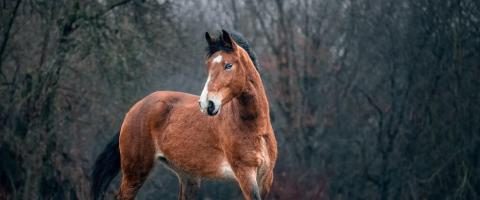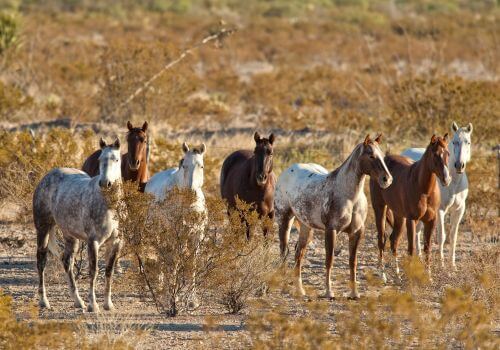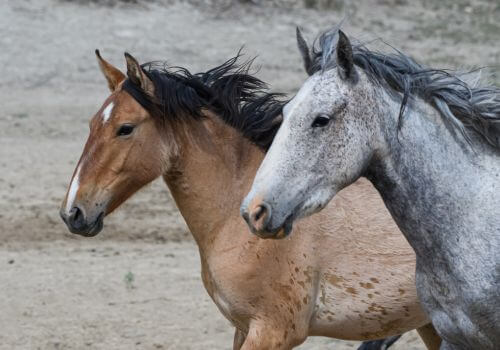
The Mustang: America’s Wild Horse
- Weight: Around 800 pounds
- Height: 14 to 15 hands
- Body Type: Stocky and hardy
- Best For: Trail riding and ranch work
- Life Expectancy: 25 to 30 years, sometimes up to 40 years

Running Free: The Mustang’s History
Mustangs are wild horses that roam the western United States. They originated from Spanish horses brought to the Americas by European explorers. Over time, many of these horses escaped, were traded to Native American tribes, or were released, forming free-roaming herds. As settlers expanded westward, these herds grew and evolved into the mustangs we know today.
In the early 1900s, mustang populations reached around two million. However, as ranching and land development increased, the number of wild horses declined significantly. The Wild Free-Roaming Horse and Burro Act of 1971 was enacted to protect mustangs from overhunting and habitat destruction. Today, the Bureau of Land Management (BLM) oversees mustang herds and implements adoption programs to help manage their population.
Size and Build
Mustangs are typically smaller horses, standing between 14 and 15 hands high and weighing around 800 pounds. Their compact, stocky build and strong legs contribute to their endurance and agility, while their wild heritage has made them exceptionally resilient and adaptable.
Bred to Be Fast and Free
Mustangs flourish in the wild, living independently without human assistance. They face challenges from overpopulation, which is why no official breeding programs are in place. However, once trained, mustangs can excel in various sporting events and activities, such as trail riding, ranch duties, dressage, and even competitions! These extraordinary horses are recognized for their remarkable speed, with some able to reach speeds of 35 to 50 miles per hour, demonstrating their innate athleticism and quick responsiveness.
Colors and Markings of Mustang Horses
Mustangs display a wide variety of coat colors, including bay, chestnut, black, gray, roan, pinto, and palomino. Some mustangs also feature stripes, patches, or spots. Their diverse appearance is a result of their mixed ancestry from various horse breeds and can result in some stunning combinations.

What Makes Mustangs So Unique?
Mustangs are known for their hardiness and surefootedness, making them excellent working horses and trail companions. Their ability to navigate rough terrain with ease sets them apart from many domesticated breeds and makes them highly valued by trail riders.
But Mustangs don't come without their own issues. Because they have evolved in the wild, they are often more self-reliant and intelligent than other horses, making them a unique challenge for trainers.
What do Mustang Horses Eat?
In the wild, mustangs survive on a diet of grass, shrubs, and other native vegetation. As domesticated horses, they require a well-balanced diet of hay, grains, and supplements. Owners must monitor their pasture intake to prevent overgrazing, as mustangs are efficient at extracting nutrients from limited food sources.
Common Health Issues of the Mustang Horse
Mustangs are generally hardy, with strong hooves and minimal health concerns. However, domesticated mustangs may need additional care to transition from wild to stable life. Behavioral challenges, such as wariness and reactiveness, are common in newly adopted mustangs and require patient training.
Grooming and Care for the Wild Mustang
Just like other horse breeds, Mustangs benefit from regular grooming to maintain coat health and remove dirt and debris. Since they have naturally strong hooves, they require routine hoof care but often need fewer interventions than other breeds. Establishing a consistent care routine is essential for building trust with an adopted Mustang and can go a long way in helping to curb some behavioral issues.
Bringing It Back to the Barn
The Mustang truly embodies the spirit of American history and resilience. Their wild nature, intelligence, and incredible versatility offer a remarkable experience for dedicated horse owners ready to invest the time and patience needed for training. Whether they're galloping freely or standing by as a loyal companion, the Mustang is a special breed with a rich and enduring legacy that captures the heart.

